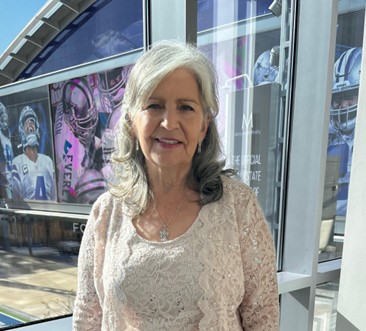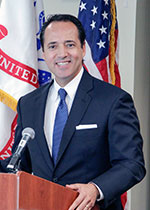AARP Hearing Center
More than a decade ago, Mercedes Bristol, then 57 and pondering retirement, was caring for an infant grandchild at her San Antonio home when her son dropped off with her four more of his kids – all under the age of 9 – for what she thought would be a temporary stay.
She’s been raising them on her own ever since – and they’re now ages 23, 21, 20, 16 and 14, with the two oldest living independently and pursuing careers.
“They’re one of my biggest accomplishments,” Bristol said. “I kept them together. There were times when I wanted to give up. But they’ve stayed together, and all five them, they look after one another. They go to car shows and concerts together, and it’s just such a sense of pride.”

For years, Bristol has been one of more than 12,000 grandparents, aunts, uncles and other relatives in Texas raising an estimated 250,000 children from their extended families. Known as kinship caregivers, many of them receive relatively minimal financial assistance from the state because they aren’t eligible or choose not to become formally licensed foster parents, which can be a laborious and slow process.
Three bills being considered by the Texas Legislature this year – all sponsored by Sen. José Menéndez, D-San Antonio, and backed by AARP Texas – aim to make reforms that bring more parity between payments to foster care parents and kinship caregivers.
Collectively, Senate Bills 162, 200, and 545 would allow relatives to receive standard foster care payments, regardless of whether they were licensed as foster parents, rather than the reduced benefits currently offered.
Monthly foster care payments in Texas range from about $800 to $2,800 per child, while relative caregivers (kinship caregivers) currently receive about half as much: a maximum of $406 per month for up to one year, plus a $500 annual stipend for as many as three years, or until the child’s 18th birthday.
“We want (kinship caregivers) to get equal capacity to take care of these kids,” Menéndez said, contending that the state’s current payment system fails to adequately recognize the well-researched advantages of placing children with their biological families and not in potentially harmful scenarios under Texas’ overstressed foster care system.
“There are not enough places for these kids in foster care,” Menéndez said. “Too often, they’re sleeping in offices, hotel rooms, and not able to get placed; and you have older children, some close to adulthood, mixed in with children who are closer to being toddlers. These (foster care) situations create a lot of problems. Children placed in these congregate settings often run away. They get access to phones and social media and get sucked into sexual trafficking and predators.”

Bristol and Menéndez say Texas’ funding streams have focused too heavily on foster care payments over kinship care. The results, they say, aren’t great: a foster care system that has long been a pipeline for young people entering homelessness, abusive situations, crime and high rates of suicide.
The cost to taxpayers for increasing kinship care payments under Menéndez’ legislation hasn’t been calculated by legislative analysts. But the costs need not be a roadblock, he says, though it’s been an argument for stalling proposals for increased kinship care payments in previous legislative sessions. Arguments have also been made in the past that increasing kinship care payments could wrongly incentive family members to seize children from their biological parents.
“I totally disagree,” Bristol says of such claims. “We already have so many grandparents raising the children, and they’re not doing it for the money. They’re doing it to keep these children safe.”
Menéndez observes that legislative leaders this year are pressing for changes to school financing that may lead to public dollars paying for private school education, known as school vouchers. “I was in a marathon-long hearing on vouchers and I kept hearing that the (taxpayer) money should follow the child. Well, that is the mantra I’ve been saying for years when it comes to (kinship care). And they’re talking about education. I’m talking about that child’s life. How and whether they eat. And how to pay for their necessities.”
Kathy Green, AARP Texas’ state and federal strategy director, said the association’s volunteers and staff at the Capitol will join the push for increased kinship care benefits.
“Non-parent relatives and close family friends who raise children perform heroic work, not only for their families but for society,” said Green. “These selfless kinship caregivers deserve recognition and adequate compensation in order to provide quality care for children and families.”
Menéndez credits Bristol for being the first person to awaken him to the needs of kinship caregivers and the financial hurdles they face. Bristol initially approached him about the time she started an organization, Texas Grandparents Raising Grandchildren, that provides education, mental health and legal support, as well as food and clothing, to grandparents in Texas who are providing direct care to their grandchildren.
Bristol eventually became a formal foster parent to her grandchildren and even legally adopted them. But she reminds that not every kinship caregiver chooses that path.
“For every one child in foster care in Texas, there are 24 others outside the foster care system being raised (in a kinship care scenario). Why should we support the needs of the one child but not the other 24?” she said. “Our state is not equitable with how we are treating these children. Every child should have the same value.”
Mark Hollis can be reached at mhollis@aarp.org or 512-574-3739.































































